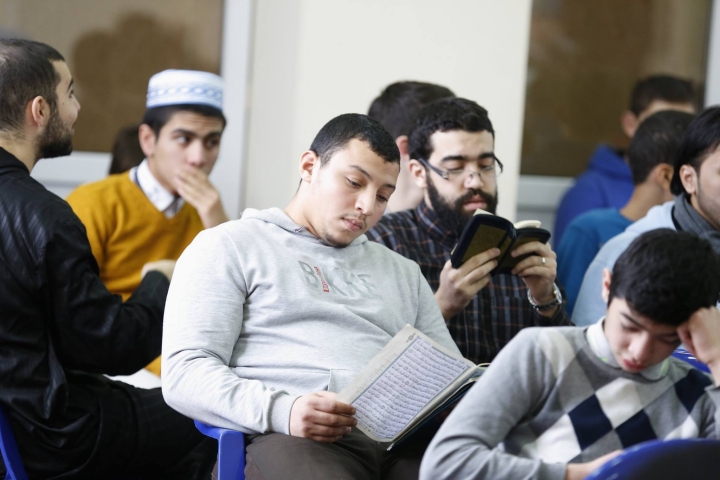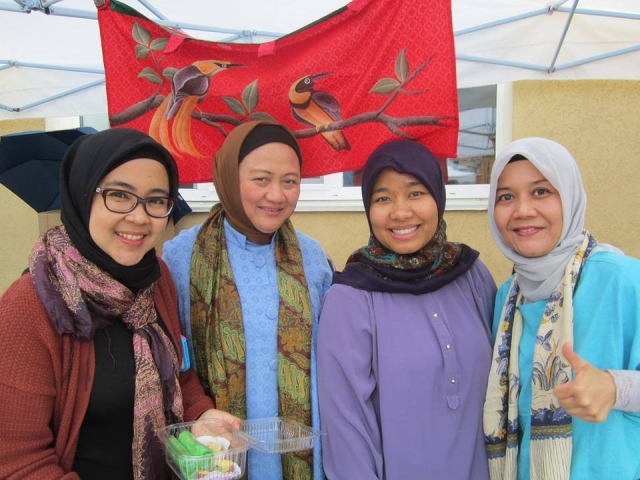Nowadays, the spiritual and national identities are the particularly acute problem for Muslims living outside the "Islamic world" (considering all convention of this term today). The ethnic groups, who have practised Islam for centuries, decide this issue in easy way: the national identity has undergone a certain Islamization, so the national manifestations (from clothes to marriage ethics) are mostly religious, "Islamic". Of course, there are certain exceptions. For example, many Muslim authorities quite reasonably condemn the celebration of Nowruz by Turkic peoples, considering that as a foreign borrowing with Zoroastrian origin. However, most European Muslims cluster about their own ethnic identity, which was Islamized centuries ago. If we are talking about the natives of Arab countries, there is generally a formal synonymy: Arab culture = Islam (of course, if we are not talking about Arab Christians).
Against this background, Muslims of those ethnic groups, where the majority practice other religions, are in another situation. Very often, after converting to Islam, they faced the cultural challenge. And the corresponding "scripts", which form their identity, depend on the particular environment. Today, many new Muslims are subjected to a variety of cultural influences (Arabic, Tatar, Turkish, Iranian, Caucasian and so on). How do Ukrainian Muslims look like under these conditions: both new converts and those who have already lived in Ukraine? Is there a phenomenon of Ukrainian Islam?
Some Muslims immediately reply that there could not be another Islam except Islam, opened by the Koran — God's Word — and explained by the Sunnah — the practice of the Prophet (peace be upon him). It is talked not of Aqidah ("doctrine"), which is the first-hand understanding of the faith, but it is talked of the practical aspects. According to the classical classification, we don’t mean ilm ("knowledge", "science") but we mean concrete a'mal ("action"), the specific way of realization of this ilm in the life. And, as we know, it is regulated not just by "principles" (usul) but also by circumstances (shurut). For example, the fatwa, religious and concretized legal thought, depends on hal ("fact"), makan ("place") and zaman ("time"). It means the concrete realities of concrete country.
Eid al-Fitr is coming. So is it possible theoretically to determine the amount of zakat al-fitr for Ukrainian Muslim, without taking into account the Ukrainian prices? Of course it is not. For example, there are the specific conventions of prayer time in accordance with the position of the Sun relative to the equator (about 20 so-called "conventions" of the counting). The difference between the beginnings of the prayers is a few minutes. The most accurate way is to use the convention, which is close to Ukraine according to astronomical characteristics.
These basic things are related to Islamic law, which in turn deduces judgments (hukm) in accordance with the circumstances. There is, however, an even broader context of the national question, which particularly concerns a lot of new Muslims.
Muslim-Ukrainian can carry out obligatory prayer in the mosque as well as his brother from another ethnic group, but he prefers to hear the khutbah on Friday in a language that he understands. As well as the concepts of halal and haram for Muslim-Ukrainians and for Muslims from other ethnic groups may be the similar (if we are not talking about such controversial issues, as smoking or makruh haram). But, when a Muslim-Ukrainian hears from some brothers that to speak only Ukrainian is a kind of a forbidden by Islam "nationalism", — that is a difficult problem. According to which rules of shariah can the other language be more important than Ukrainian? In Islam, there is only one language that requires special veneration. It is Arabic, the language of the Koran and the daily prayers. For example, Ibn Taymiyyah in his famous work “Iktidaa Sirat al-Mustaqim” ("Necessity of the straight path") urged on Muslims to preserve the Arabic and to avoid its mixing with other languages. But when somebody of contemporaries openly condemns any national manifestations, in fact he does ignore the Qur'anic statement "O mankind, indeed We have created you from male and female and made you peoples and tribes that you may know one another" (Qur'an, 49:13). For instance, the issue about national dress, which now causes debate among Muslims, should be solved in the same way. On what grounds does anybody forbid the Muslim to dress vyshyvanka (embroidered shirt), if it does not have any specific Christian or other religious signs? Yes, to some extent, it is a demonstration of Ukrainian identity. But if all relevant criteria for the men's and women's clothing, which has vyshyvanka, are in accordance with the requirements of Shariah, why cannot it be worn in the same way as Arabic saub, Pakistani or Indian dhoti, which, incidentally, were common in those areas still in pre-Islamic times? Moreover, in the near future, specific "Muslim vyshyvanka" may appear in Ukraine, like the clothes, which is common among the Balkan Muslims. And nobody doubts in its compliance with Shariah requirements of length and width.
Of course, there are a lot more complex issues associated with the participation of Muslims in public life of Ukraine. For example, many Muslims say ATO is "not our war", because it is not going, in their view, "under the Islamic flag ". For others it is a struggle for their land and the freedom to practice their religion (that is much more difficult in the Russian-occupied Crimea or the self-proclaimed republics). In general, this dilemma is quite complex and it transcends the scope of the Ukrainian question. It depends on the position of the particular society about the present. It is significant, however, that many Muslims, who consider that such war is "not ours" and actively criticize the democratic system, are looking for the shelter in the West, in the EU, rather than in North Korea, Iran and the Russian Federation. Despite some limitations, in Ukraine, you can freely call others for Islam. There are no laws that specifically are "against" this religion ("anti-minarets" or "anti-hijabs", "lists of extremist literature", etc.). And therefore the question arises, whether the role, which Muslim communities play in Ukraine today, is achievement of Ukrainian Islam, which is not “separate” but the kind of the manifestation of religiosity in the particular region.
Muhammad al-Assad, a well-known Muslim author of the twentieth century, born in Lviv, wrote in his commentary to the Koranic ayah, mentioned above, the following: "The mankind evolution to "nations and tribes" rather promotes than underestimates their desire to understand and appreciate the fundamental human singularity, emphasizing their differences in appearance. So it condemns all racial, ethnic or tribal prejudice". Does such openness to dialogue, promoted by Ukrainian Muslims (to overcome prejudice) for years, perform the realization of the nation in a positive rather than a negative sense? According to the terminology of the prominent Islamic thinker of the Middle Ages, Ibn Khaldun, who widely used concept asabiyya ("attachment to the tribe [family, ethnicity]") as an instrument of social progress, we can say that this asabiyya is "positive". It unites, rather than divides, and it contributes to comply with the Qur'anic ayah "Cooperate in righteousness and piety" (Qur'an, 5: 2).
Ukrainian Islam is not a phenomenon of the "nationalization of Islam". But it is the idea of Muslim solidarity on the principles of joint civil benefits, which in the modern Islamic law is termed al-maslaha al-'amma ("public interest"). It is not "blood" identity (because, even in the ethnic meaning, Ukrainian is a broad notion), but it is the civil identity, that has the relevant national attributes. And these attributes do not conflict, but promote and contribute to the "goals" of God's law (Maqasid Al-Shariah). That is how this problem is formulated and solved in the "fiqh of minorities" (fiqh al-akalliyyat), the modern approach of answering the questions of Muslims, who are living in "non-Muslim" countries. For example, Yusuf al-Karadauvi points out that for preserving Islamic identity in the "fiqh of minorities" we should focus on the Islamic community as a whole, rather than on individuality of every Muslim. This, in fact, shows a social imperative role of Islam, protecting religion from becoming the individual affair of every person. The particular community creates this social categoricity in its regional or national limits, due to its specific needs and circumstances.
It is impossible to consider Ukrainian Islam as a service for the secular state (just as it has happened with the "official" Islam in Russia). It is rather the solidarity of Muslims, who are belonging to a particular cultural field and, in turn, trying to Islamize it "with wisdom and good instruction, and argue with them in a way that is best" (Qur'an, 16: 125). And it would be possible only if there were any bridges for dialogue. Actually, one of the best links is the Ukrainian national identity as one of the concrete manifestations of the human community.




1 Comment
Anis Ahmad Khan replied on
Good thinking and views for Islam. Inshallah I will reach to Bila Tserkva on 29 Sept and on 3 October to Kiev required your help for Salat. Haji Anis from India.
D
Add new comment
Log in or register to post comments